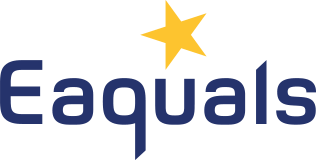From the perspective of the Eaquals Scholarship recipient

From the perspective of the Eaquals Scholarship recipient
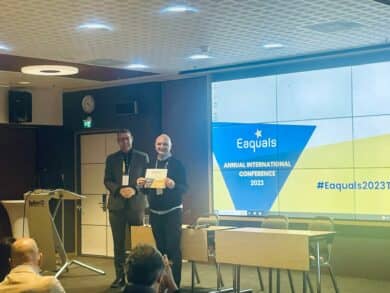 This year’s recipient of the Eaquals Scholarship Scheme is Antonio Badagliacca, who attended the Eaquals Conference from 27th to 29th April 2023, in Tallinn, a breathtaking city, rich in culture and history. Below is his account of the event.
This year’s recipient of the Eaquals Scholarship Scheme is Antonio Badagliacca, who attended the Eaquals Conference from 27th to 29th April 2023, in Tallinn, a breathtaking city, rich in culture and history. Below is his account of the event.
The Eaquals conference, which took place at the Radisson Blu Hotel Olumpia, revolved around the following four pillars of the education industry:
– Leadership and management,
– Staff development and wellbeing,
– Course design, CEFR and assessment,
– Language teaching and learning.
Management Training
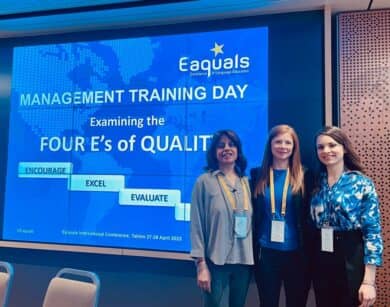 On Thursday 27th April, trainers Nergis Uyan and Ozlem Baykan delivered three sessions on management titled ‘The Four Es of Quality’, which are encourage, excel, evaluate, and ensure. They started off the first session by asking the attendees what quality was for them, both at work and in life. At the end of their presentation, the trainers asked everyone to reevaluate their initial idea of quality and check if their perspectives about this topic had changed or if they had something to add. One of the most important takeaways of the sessions was that quality is based on communication and requires total staff involvement. It is not based on the effort of a few people as it is a culture, a mindset, a way of thinking in which every team member must play a significant role. Quality is neither an accident nor a coincidence, but it is the result of the efforts and the commitment of all staff members who work towards achieving the same goal.
On Thursday 27th April, trainers Nergis Uyan and Ozlem Baykan delivered three sessions on management titled ‘The Four Es of Quality’, which are encourage, excel, evaluate, and ensure. They started off the first session by asking the attendees what quality was for them, both at work and in life. At the end of their presentation, the trainers asked everyone to reevaluate their initial idea of quality and check if their perspectives about this topic had changed or if they had something to add. One of the most important takeaways of the sessions was that quality is based on communication and requires total staff involvement. It is not based on the effort of a few people as it is a culture, a mindset, a way of thinking in which every team member must play a significant role. Quality is neither an accident nor a coincidence, but it is the result of the efforts and the commitment of all staff members who work towards achieving the same goal.
Day 1: Plenary presentations and elective sessions
Between Friday and Saturday, there were a total of fifty-seven sessions one could choose from aside from the opening and closing plenary sessions. It was a struggle for me to pick the right session to follow as many great speakers were delivering extraordinary and insightful workshops at the same time. Below I will briefly outline my highlights of this conference based on the sessions that I attended and the information I gathered.
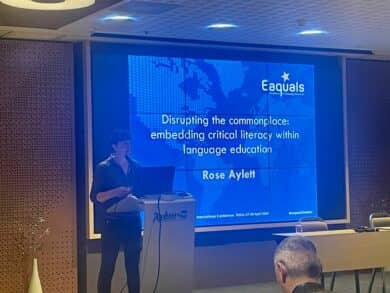 On Friday, the opening plenary was brilliantly delivered by Rose Aylett, who talked about ‘Disrupting the commonplace: embedding critical literacy within language education.’ In her presentation the speaker helped us understand what critical literacy was, by covering the following four points:
On Friday, the opening plenary was brilliantly delivered by Rose Aylett, who talked about ‘Disrupting the commonplace: embedding critical literacy within language education.’ In her presentation the speaker helped us understand what critical literacy was, by covering the following four points:
- disrupting the commonplace,
- interrogating multiple view points,
- focus on the socio-political,
- taking action for social justice.
This presentation helped me understand that us educators can embed critical literacy by focusing on teaching methods, materials, management techniques and teacher education. It is important to see everyday life through different lenses by contextualizing the information being used while teaching in class and by showing respect to all the parties involved.
The first two sessions after the plenary talk focused on the different aspects of Eaquals, which is a non-profit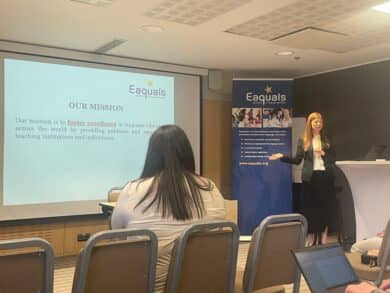 membership association. In her talk, Lou Mclaughlin gave an overview of the accreditation process by pointing out the following principles:
membership association. In her talk, Lou Mclaughlin gave an overview of the accreditation process by pointing out the following principles:
- a “can-do” principle – which is about the practical ability of how things are done in each institution,
- the differentiation principle according to which each institution is unique,
- the need for common standards that must be met by the institution in order to receive the accreditation.
In the second session, Ludka Kotarska, explained how to use the resources made available on the Eaquals website.
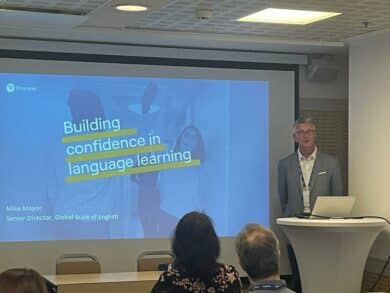 The third session that I followed, titled ‘I’m just no good at English: building confidence with the Global Scale of English’, was led by Mike Mayor who talked about the lack of self-esteem that students experience while learning English. He then introduced the Global Scale of English (GSE) which outlines what a student can achieve on a scale from 10 to 90. The following are the benefits of using such a scale:
The third session that I followed, titled ‘I’m just no good at English: building confidence with the Global Scale of English’, was led by Mike Mayor who talked about the lack of self-esteem that students experience while learning English. He then introduced the Global Scale of English (GSE) which outlines what a student can achieve on a scale from 10 to 90. The following are the benefits of using such a scale:
- supports a lifetime of learning,
- ensures the integration of learning, teaching, and assessment,
- accelerates learner progress,
- gives every learner an opportunity to succeed,
- builds teacher confidence.
The next session I chose to attend was conducted by Joel David Compton who tackled the issue of teaching EAP classes both online and face-to-face. He outlined the similarities and the differences of these classes based on students’ reactions and feedback. In his talk, Joel explained what goes on in EAP classes at his faculty and he invited everyone in the room to suggest ideas to become better EAP teachers and boost students’ motivation.
Later, I attended Mary Grennan’s session who spoke about the International Education Mark and CEFR and how this would impact English schools in Ireland as new regulations are going to enter into force.
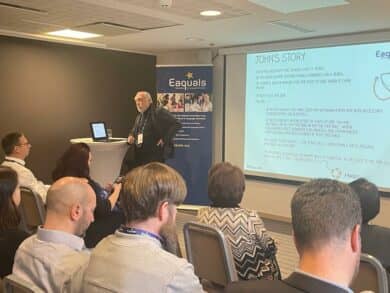 Liam Brown’s session was the last of the day. He spoke about the relationship that managers and leaders establish with their teachers in a school. Liam described different teachers’ profiles who work within the same institution and how they might feel while working in that specific place. He elicited a lot of examples explaining the importance of keeping employees intellectually stimulated and motivated to deliver their best performance at work.
Liam Brown’s session was the last of the day. He spoke about the relationship that managers and leaders establish with their teachers in a school. Liam described different teachers’ profiles who work within the same institution and how they might feel while working in that specific place. He elicited a lot of examples explaining the importance of keeping employees intellectually stimulated and motivated to deliver their best performance at work.
Day 2: Plenary presentations and elective sessions
I started the day with Richard Chinn’s presentation ‘Not just talking: dialogic reflection in teacher development.’ He explained that learning is a dialogic process in
which meanings are moderated through language. Richard, gave examples from the school he works at, and proceeded to delve into the following two topics:
- emergent language, which is the language that arises in class,
- critical incident, which is an unplanned event in a lesson that a teacher sees as interesting and challenging.
After I attended Aysegul Karaman’s talk who focused on ‘Managing conflict: a guide for managers at schools.’ In her brilliantly executed presentation, the speaker analysed different conflict managing styles and assigned each an animal. The animals represented the style that a manager prefers to use or ends up using in relation to the circumstances. She then conducted a survey which highlighted the fact that collaboration is always the best option to promote healthy working relationships.
The next session I attended was led by Charlotte Murphy ‘The personal journey of self-directed professional development: how to decide which path to take.’ The presentation focused on the different phases teachers go through in their career such as burnout, career development, wanting to learn more and developing as a teacher by adopting the examine-extend-improve method. She then asked the attendees to consider the WOOP model (wish, outcome, obstacle, plan) and how this model could be used to start a self-directed teacher development.
Stephanie Smith, Emma Walton and Beata Schmid led a session on ‘Tackling climate change with a sustainability course’ which I also attended. During this session they explained how they put together a six-week course focusing entirely on climate change and all the challenges that this topic brings with it. The idea is based on CLIL and aims to equip the students with the language and knowledge needed to deal with environmental issues not only by attending the course but also by being environmentally active out of class. This may include beach clean-ups or planting trees, to name a few.
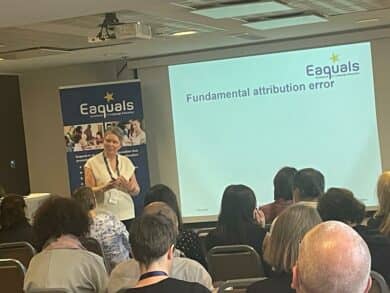 The following presentation I decided to join was the one delivered by Ania Kolbuszewska titled ‘Difficult conversations made easier.’ This workshop was based on the stressful situations that might characterize our workplaces. We went through different scenarios, and we had the chance to bring up ideas by working in groups. At the end of the session, one of the solutions to the problems presented was to focus on developing listening skills to avoid conflict.
The following presentation I decided to join was the one delivered by Ania Kolbuszewska titled ‘Difficult conversations made easier.’ This workshop was based on the stressful situations that might characterize our workplaces. We went through different scenarios, and we had the chance to bring up ideas by working in groups. At the end of the session, one of the solutions to the problems presented was to focus on developing listening skills to avoid conflict.
I also attended the presentation ‘Spotlight on learning: putting a new spin on classroom practice’ delivered by Jacqueline Douglas and Julie Wallis. The discussion brought out the difficulty in finding a bridge between the technicality of the teaching profession and the needs of English learners within the classroom.
The last elective presentation I attended was the one led by Chris Brandwood, who tackled ‘The future of English: implications for employers and career-oriented learners.’ The talk highlighted the fact that the demand for English is constantly changing among employers and career-oriented learners. He mentioned that there are eight areas that could have an impact on this and went on to explain what this would mean for language education providers.
After a short break, all attendees took part in the closing plenary during which Ben Knight talked about ‘Who’s the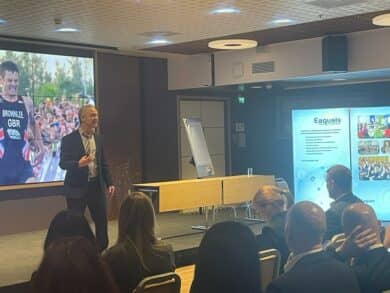 best person to manage your teachers’ professional development?’ In his insightful presentation, Ben highlighted the struggles and frustrations that a teacher may encounter while dealing with professional development but then showed us how to analyse and overcome obstacles and become the leaders of our own professional development.
best person to manage your teachers’ professional development?’ In his insightful presentation, Ben highlighted the struggles and frustrations that a teacher may encounter while dealing with professional development but then showed us how to analyse and overcome obstacles and become the leaders of our own professional development.
It is extremely important to mention that every detail of this three-day conference was greatly taken care of. All the coffee breaks, lunches at the Radisson Hotel and dinners organized in different restaurants of the city were all characterized by great food, wonderful atmosphere to exchange ideas and unforgettable opportunities to network with people who I could learn from.
Antonio Badagliacca
16th May 2023
